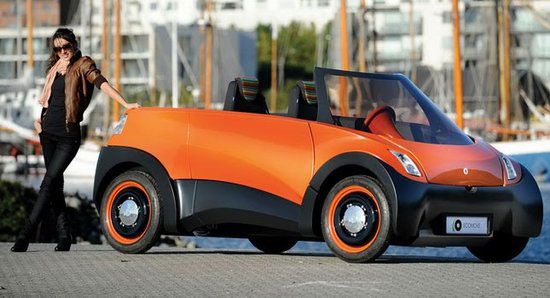New publications
The new eco-car can travel up to 800 kilometers
Last reviewed: 01.07.2025

All iLive content is medically reviewed or fact checked to ensure as much factual accuracy as possible.
We have strict sourcing guidelines and only link to reputable media sites, academic research institutions and, whenever possible, medically peer reviewed studies. Note that the numbers in parentheses ([1], [2], etc.) are clickable links to these studies.
If you feel that any of our content is inaccurate, out-of-date, or otherwise questionable, please select it and press Ctrl + Enter.
Until now, one of the main drawbacks of electric cars has been their limited range on a single battery charge. However, this does not affect the eco-car created by the Danish concern ECOmove. The new model can travel about 800 km on a single full charge. With such an indicator, the car, called QBEAK, can well claim popularity among potential buyers, especially in light of the constantly rising fuel prices. For comparison: the Chevrolet Volt EV has a range of 603 km, and the Nissan Leaf - 222 km.
According to ECOmove, the new product can reach speeds of up to 120 km/h using an electric motor and fuel cells that convert a mixture of bioethanol and water into electricity using batteries.
Externally  , the eco-car is quite compact and is a two-seater convertible, comparable in size to the VW Golf. The developers say that they managed to achieve a surprisingly high mileage by reducing the weight of the car, as well as using a new aerodynamics system that helps accelerate the car without significant energy and fuel costs. The developers also say that the new product fits harmoniously into the urban landscape, and in addition, due to its compact size, it is easy to park and convenient to maneuver in the flow of cars.
, the eco-car is quite compact and is a two-seater convertible, comparable in size to the VW Golf. The developers say that they managed to achieve a surprisingly high mileage by reducing the weight of the car, as well as using a new aerodynamics system that helps accelerate the car without significant energy and fuel costs. The developers also say that the new product fits harmoniously into the urban landscape, and in addition, due to its compact size, it is easy to park and convenient to maneuver in the flow of cars.
The car weighs only 425 kg, and the developers say that several patented technologies are used here to reduce weight, but not at the expense of functionality. For example, it uses an array of batteries built directly into the body, and they can be charged while driving from the operation of the brake system.
The developers say that using bioethanol as a fuel is cost-effective because of the low cost of the fuel. It has the same efficiency as chemical ethanol, but bioethanol can be produced from a variety of sources, including natural gas, biomass or municipal waste.
According to the developers, the new model currently exists only as a demo model, but it will be presented in a commercial version by 2013.
